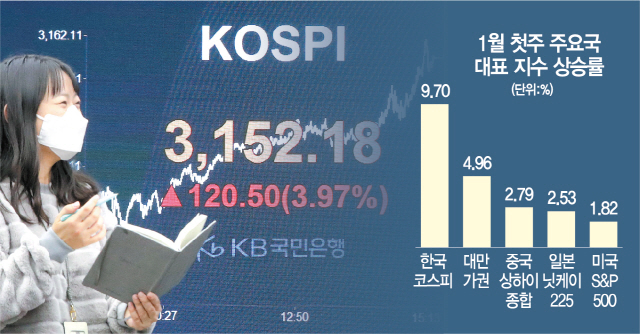Donghak ant bet 8 trillion only after New Year
“Liquidity-driven supply and demand swallows risks”
Share price versus corporate profit is’short-term overheating’
“Restrict the number of chases… respond calmly”
 viewer
viewer
In the domestic stock market, dangerous celebrations are ringing day after day. There are many positive interpretations that the KOSPI index has penetrated to 3,100 at once in the new year thanks to abundant market funds, and is now overcoming the undervaluation of the last decade. will be. As the domestic stock market, which is a short-term overheating pattern, could rapidly stagger even with small variables, investors should be prepared for volatility.
According to the Korea Exchange on the 10th, the KOSPI index, which rose the most among the major 20 countries (G20), rose 9.70% in the first week of the new year (4-8 days) with an increase of 30.8% last year. It is the highest in 13 years since October 31, 2008 (18.6%), after falling below 1,000 points due to the financial crisis in the history of the domestic stock market. The US (1.82%) and Taiwan (4.96%) are also breaking their highs this year, but the KOSPI’s rise is the largest among them. Also, since the first week of November of last year, the KOSPI has continued a weekly bull market for 10 consecutive weeks. This is the first time in about 10 years since April 30, 2010. According to Daishin Securities, only five cases have risen for 10 consecutive weeks since 1980.
The strong strength of the Korean stock market is explained by a number of reasons, such as expectations for economic improvement, good news for individual companies, and the stimulus of the US economy. However, among them, the analysis that enormous liquidity is sustained is dominant. According to Hana Financial Investment, the amount of M2 currency, including funds that can be easily converted into cash, increased by 35 trillion won from the previous month in October last year (3,150 trillion won). This is the second largest increase ever. Household money increased by 18.500 trillion won compared to the previous month, showing the largest increase since 2006. With this liquidity as a springboard, individual investors continue to flow into the stock market. As of this year, individuals net bought 1.18 trillion won worth of KOSPI alone. In addition, the investor’s deposit, which is a waiting fund for the stock market, reached about 70 trillion won. At the end of last year, it was around 65,522.7 billion won. Including the balance of Money Market Fund (MMF) and Securities Company Comprehensive Asset Management Account (CMA), the amount of money that individuals attracted to the stock market in the new year alone exceeds 8 trillion won. Credit loans (20 trillion 122.3 billion won) to buy stocks from debt exceeded 20 trillion won. It is the highest since 1998. Ji-ho Yoon, head of the Research Center at Ebest Investment & Securities, diagnosed that “supply and demand driven by liquidity is engulfing all risks.”
Of course, even experts cannot conclude that the present is a’bubble’. Nevertheless, there are not a few signs of short-term overheating. In particular, if the stock market continues to record highs and profits increase, there is no big problem, but it is a diagnosis that the current situation is not so. For example, in 2017, when the KOSPI index exceeded the 2,500 line and showed a strong market, net profit in 2017 was about 140 trillion won. This is the highest level ever. On the other hand, the 2020 KOSPI net profit consensus is about 90 trillion won, and this year it is estimated to be about 130 trillion won. Corporate profits are not at all-time highs, which means that the stock price is constantly shifting to its all-time high. Jeong Yong-taek, head of IBK Investment & Securities Research Center, “The so-called’Buffett Index’, which is divided by the nominal gross domestic product (GDP), has surpassed 1x, meaning overheating, and the KOSPI 12-month leading stock price-to-earnings ratio (PER) also peaked by over 14x. He said. Professor Ahn Dong-hyun of Seoul National University said, “It is true that operating profits have improved significantly in semiconductors, etc., but the stock price flow is excessive to explain it. The higher (stock price), the more dangerous it became.”
Accordingly, there is an observation that if a variable that impacts the liquidity market occurs, the wavelength will be difficult. In fact, Hong Nam-ki, Vice Prime Minister and Minister of Strategy and Finance, appeared on a broadcast program this morning and pointed out, “If the coexistence between the real thing and the financial market is weakened, there may be some negative impact in the future.” The market is paying attention to the Bank of Korea Financial Monetary Committee on the 15th. Although the base rate is likely to be frozen, we are closely watching the comments made by Governor Lee Ju-yeol and other financial committee members. US President Joe Biden’s inauguration ceremony on the 20th is also considered a variable. Lee Jin-woo, head of the investment strategy team at Meritz Securities, said, “The United States presents the agenda of the administration at the inauguration ceremony of the president and implements it.” Park Seok-hyun, head of the investment strategy team at KTB Investment & Securities, said, “The market’s general rise will not be damped, but there is a possibility that the pace of the rise will be adjusted.” . / Reporters Wanki Lee, Sungho Park, Hyojeong Park [email protected]
< 저작권자 ⓒ 서울경제, 무단 전재 및 재배포 금지 >
